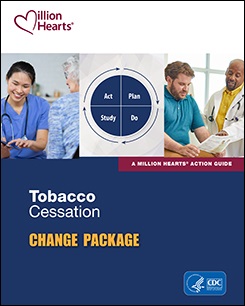The Million Hearts® initiative is a national collaborative effort championed by the Centers for Disease Control and Prevention and the Centers for Medicare & Medicaid Services to prevent 1 million heart attacks and strokes in 5 years. The initiative aims to prevent heart disease and stroke by:
- Improving access to quality and effective care
- Improving the quality of care through ABCS (appropriate aspirin therapy, blood pressure control, cholesterol management, and smoking cessation)
- Focusing clinical attention on the prevention of heart attack and stroke
- Activating the public to lead a heart-healthy lifestyle
- Improving prescription adherence to appropriate medications
Tobacco use has been shown to raise triglyceride (a type of fat) levels in blood, lower “good” cholesterol (HDL), make blood stick and more likely to clot, damage cells that line blood vessels, increase the buildup of  plaque in blood vessels, and cause thickening and narrowing of blood vessels. One of every four deaths from cardiovascular disease can be attributed to smoking .1,2 In order to aid clinicians to deliver cessation support and treatment to patients who use tobacco, the Million Hearts® initiative recently launched their Tobacco Cessation Change Package (TCCP) which is a quality improvement tool that:
plaque in blood vessels, and cause thickening and narrowing of blood vessels. One of every four deaths from cardiovascular disease can be attributed to smoking .1,2 In order to aid clinicians to deliver cessation support and treatment to patients who use tobacco, the Million Hearts® initiative recently launched their Tobacco Cessation Change Package (TCCP) which is a quality improvement tool that:
- Is intended for health care professionals in outpatient, inpatient, and behavioral health settings, and public health professionals who partner with and/or deliver services to individuals who smoke.
- Presents a list of process improvement that clinicians can implement as they seek to deliver optimal treatment to patients who use tobacco.
- Gives clinical teams a practical resource to increase the reach and effectiveness of tobacco cessation interventions and to incorporate these interventions into the clinical workflow.
Download the Tobacco Cessation Change Package here.
While you’re there, be sure to check out the National Behavioral Health Network for Tobacco & Cancer Control resources featured in the change package!
Sources
- U.S. Department of Health and Human Services. The Health Consequences of Smoking—50 Years of Progress: A Report of the Surgeon General. Atlanta: U.S. Department of Health and Human Services, Centers for Disease Control and Prevention, National Center for Chronic Disease Prevention and Health Promotion, Office on Smoking and Health, 2014 [accessed 2018 Mar 22].
- Department of Health and Human Services. A Report of the Surgeon General. How Tobacco Smoke Causes Disease: What It Means to You. Atlanta: U.S. Department of Health and Human Services, Centers for Disease Control and Prevention, National Center for Chronic Disease Prevention and Health Promotion, Office on Smoking and Health, 2010 [accessed 2018 Mar 22].
